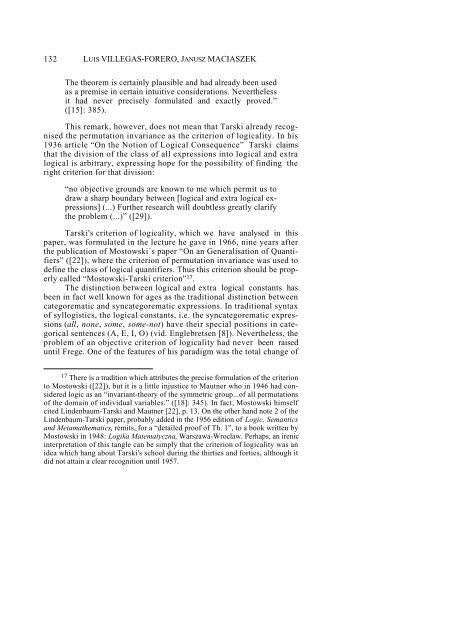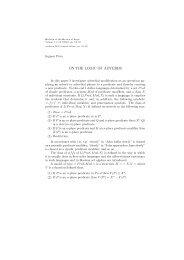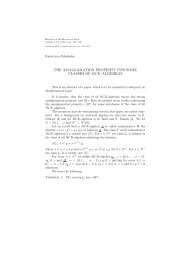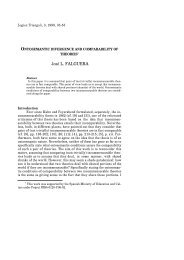Luis VILLEGAS-FORERO, Janusz MACIASZEK
Luis VILLEGAS-FORERO, Janusz MACIASZEK
Luis VILLEGAS-FORERO, Janusz MACIASZEK
You also want an ePaper? Increase the reach of your titles
YUMPU automatically turns print PDFs into web optimized ePapers that Google loves.
132 LUIS <strong>VILLEGAS</strong>-<strong>FORERO</strong>, JANUSZ <strong>MACIASZEK</strong><br />
The theorem is certainly plausible and had already been used<br />
as a premise in certain intuitive considerations. Nevertheless<br />
it had never precisely formulated and exactly proved.”<br />
([15]: 385).<br />
This remark, however, does not mean that Tarski already recognised<br />
the permutation invariance as the criterion of logicality. In his<br />
1936 article “On the Notion of Logical Consequence” Tarski claims<br />
that the division of the class of all expressions into logical and extra<br />
logical is arbitrary, expressing hope for the possibility of finding the<br />
right criterion for that division:<br />
“no objective grounds are known to me which permit us to<br />
draw a sharp boundary between [logical and extra logical expressions]<br />
(...) Further research will doubtless greatly clarify<br />
the problem (...)” ([29]).<br />
Tarski's criterion of logicality, which we have analysed in this<br />
paper, was formulated in the lecture he gave in 1966, nine years after<br />
the publication of Mostowski´s paper “On an Generalisation of Quantifiers”<br />
([22]), where the criterion of permutation invariance was used to<br />
define the class of logical quantifiers. Thus this criterion should be properly<br />
called “Mostowski-Tarski criterion” 17 .<br />
The distinction between logical and extra logical constants has<br />
been in fact well known for ages as the traditional distinction between<br />
categorematic and syncategorematic expressions. In traditional syntax<br />
of syllogistics, the logical constants, i.e. the syncategorematic expressions<br />
(all, none, some, some-not) have their special positions in categorical<br />
sentences (A, E, I, O) (vid. Englebretsen [8]). Nevertheless, the<br />
problem of an objective criterion of logicality had never been raised<br />
until Frege. One of the features of his paradigm was the total change of<br />
17 There is a tradition which attributes the precise formulation of the criterion<br />
to Mostowski ([22]), but it is a little injustice to Mautner who in 1946 had considered<br />
logic as an “invariant-theory of the symmetric group...of all permutations<br />
of the domain of individual variables.” ([18]: 345). In fact, Mostowski himself<br />
cited Lindenbaum-Tarski and Mautner [22], p. 13. On the other hand note 2 of the<br />
Lindenbaum-Tarski paper, probably added in the 1956 edition of Logic, Semantics<br />
and Metamathematics, remits, for a “detailed proof of Th. 1”, to a book written by<br />
Mostowski in 1948: Logika Matematyczna, Warszawa-Wroclaw. Perhaps, an irenic<br />
interpretation of this tangle can be simply that the criterion of logicality was an<br />
idea which hang about Tarski's school during the thirties and forties, although it<br />
did not attain a clear recognition until 1957.






